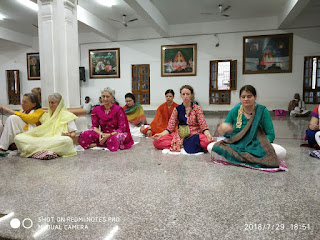A personal blog exploring contemporary issues, ideas, and reflections on science, society, philosophy, and culture. Short-form essays, commentary, and curated thoughts from an inquisitive mind.
From My Corner of the World
This is my personal diary — a space where I try to make sense of the world around me.
You'll find short prose on contemporary topics that catch my interest.
What can you expect?
The best adjectives? … maybe, once in a while.
Flowery verbs? … not really my thing.
Haiku-like brevity? … I try.
Thanks for stopping by — hope you’ll visit again.
August 17, 2018
August 12, 2018
The Divine Encounter: When a British Collector Met a Hindu Saint in India
The period of British rule in India is often associated with the introduction of Christianity to the subcontinent, along with its notorious history of mass conversions. Missionaries, in their quest to spread the Christian faith, found success among the lower echelons of India's caste system. However, amidst this backdrop, there are intriguing stories of how British rulers were also influenced by Hinduism and its revered saints. One such remarkable historical incident involves the interaction between a British collector and a prominent Hindu saint in the 19th century.
Sri Raghavendra Swamiji, a renowned saint and scholar, was a staunch proponent of the dvaita philosophy in the 16th century. His spiritual teachings and miraculous powers garnered millions of admirers across various states, including myself. His influence transcended religious boundaries, attracting devotees from diverse faiths, including Christianity. Two notable believers were Sir Thomas Munro and the Nawab of Adoni.
Sri Raghavendra Swamiji, a renowned saint and scholar, was a staunch proponent of the dvaita philosophy in the 16th century. His spiritual teachings and miraculous powers garnered millions of admirers across various states, including myself. His influence transcended religious boundaries, attracting devotees from diverse faiths, including Christianity. Two notable believers were Sir Thomas Munro and the Nawab of Adoni.
Sir Thomas Munro's Journey
Sir Thomas Munro, 1st Baronet, arrived in India in 1779, where he began his career with an infantry cadet ship in Madras. He served diligently with his regiment during the challenging conflict against Haidar Ali. In 1819, he was appointed as the governor of Madras, earning renown for implementing the 'Ryotwari system.'
A Real-Life 'Lagaan' Moment
Sir Thomas Munroe & Sri Raghavendra Swami, Mantralaya Incident
The intriguing connection between Sir Thomas Munro and Sri Raghavendra Swami unfolds during Munro's tenure as the Collector of Bellary in 1800. The Madras Government issued an order directing him to collect the entire income from the Raghavendra Swamy Matha and the village of Mantralaya. Despite their efforts, the revenue officials found it impossible to comply with this directive.
Intrigued by the situation, Sir Thomas Munro decided to investigate the matter personally. With deep reverence, he removed his hat and shoes as he entered the sacred precincts of the Matha. To everyone's astonishment, Sri Raghavendra Swamiji himself emerged from the Vrindavana (sacred resting place) and engaged in a conversation with Munro. Their discussion centered on the resumption of endowment.
Remarkably, the saint was visible and audible only to Sir Thomas Munro, who received the divine blessing of Manthrakshate. Deeply moved by this transcendent encounter, Munro returned and issued an order in favor of the Matha and the village. This historic notification was published in the Madras Government Gazette, Chapter XI, page 213, under the title "Manchali Adoni Taluka." Copies of this order are preserved in Fort St. George and Mantralaya, serving as a testament to Munro's blessed encounter with Rayaru himself.
Fast forward 218 years, and the fifth generation of Munro's family visited Mantralaya in July 2018 to seek the blessings of Rayaru, continuing the enduring connection between British rulers and Hindu saints.
The fascinating interplay between British colonial India and the spiritual realm showcases the richness and diversity of India's cultural tapestry, where even foreign rulers found themselves touched by the profound spirituality of the land.
Explore the deep-rooted connections between Lord Hanuman and Sri Raghavendra Swami in our related article. - check here
Subscribe to:
Comments (Atom)






